The Future of E-Commerce in UAE 2025: How Custom Mobile Apps Can Drive Growth
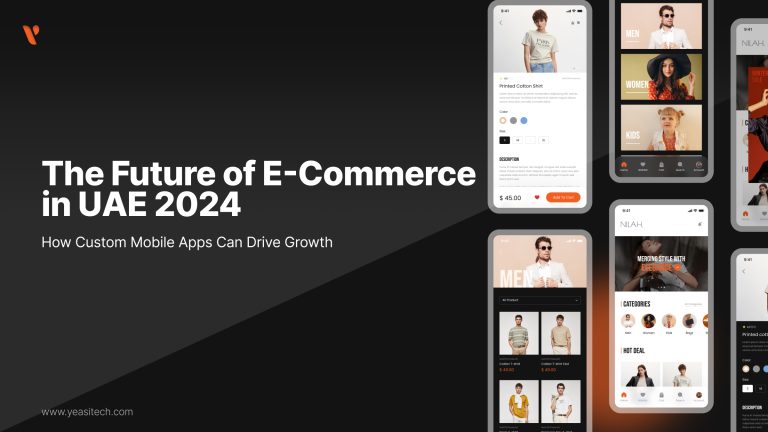
The e-commerce industry in the UAE has experienced explosive growth, driven by advancements in technology, increased internet penetration, and shifting consumer behavior. According to Statista, the market is projected to reach $8.2 billion by 2025, continuing its impressive upward trajectory from the $5.2 billion recorded in 2022.
As this market matures, businesses face heightened competition, and staying ahead requires adopting innovative strategies. One approach gaining traction is the development of custom mobile apps tailored specifically to the needs of the UAE’s diverse consumer base.
In this article, we’ll explore why custom mobile apps are critical for UAE e-commerce businesses in 2025, delving into the changing consumer habits, evolving technology trends, and competitive landscape. We’ll also showcase real-life case studies and examples that highlight the transformative potential of mobile apps in the UAE’s e-commerce industry.
The UAE’s e-commerce landscape is rapidly evolving. While major players like Noon, Souq (now Amazon.ae), and international giants such as Alibaba dominate, the market also thrives with smaller niche players catering to technology, fashion, and luxury segments. The UAE’s tech-savvy population, combined with the convenience of online shopping, has driven this growth, with mobile commerce leading the charge. In fact, mobile shopping now accounts for over 80% of all e-commerce transactions in the UAE, underscoring the critical role of mobile apps in shaping the future of retail.
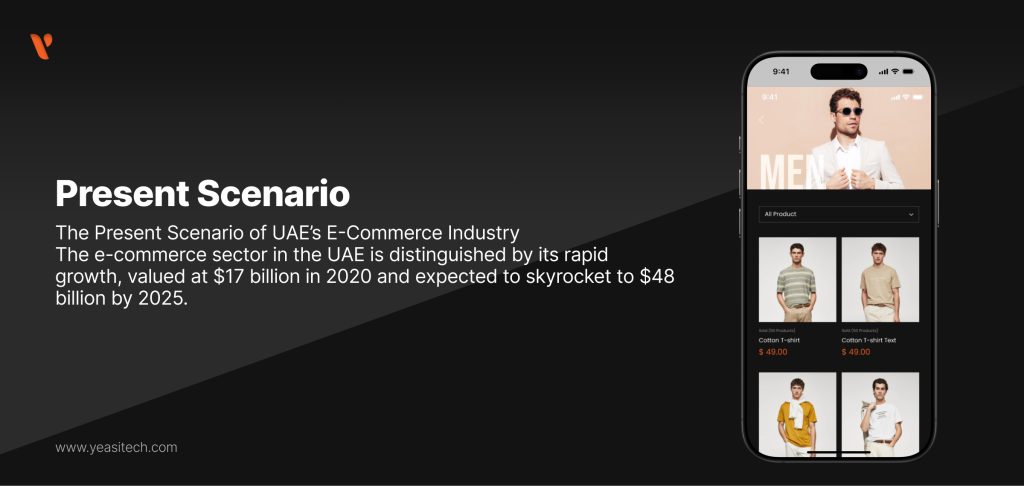
The e-commerce sector in the UAE is distinguished by its rapid growth, valued at $17 billion in 2020 and expected to skyrocket to $48 billion by 2025. This growth is not surprising given the nation’s high internet penetration (almost 100%), favourable business environment, and tech-friendly population.
Despite this remarkable growth, competition is fierce. Local platforms like Noon and Amazon.ae dominate the marketplace, but there is also a proliferation of niche players and smaller startups making waves in specific product categories. These businesses are finding that custom mobile apps offer the best avenue for standing out, fostering customer loyalty, and capturing a greater market share.
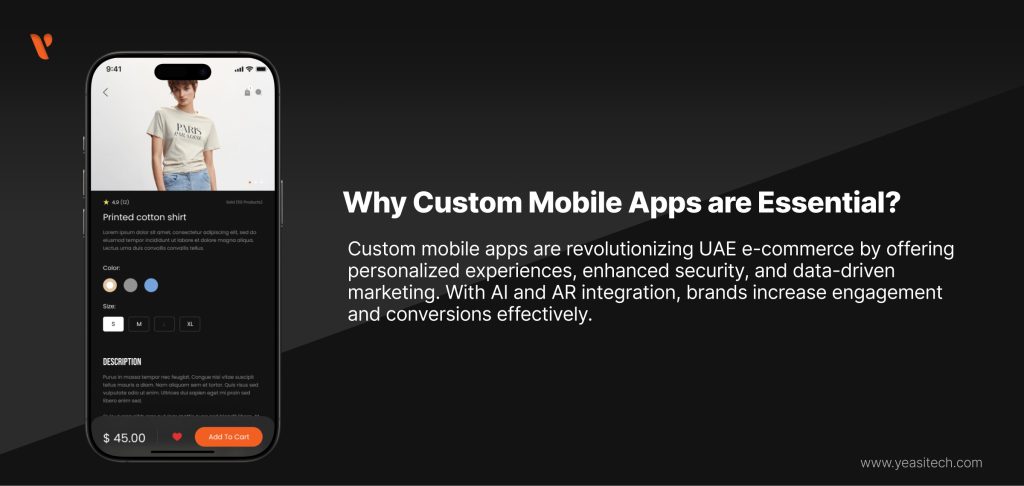
Here are the reasons why custom mobile apps are crucial for maintaining competitiveness in the UAE e-commerce market:
Users may enjoy a seamless, user-friendly experience designed with the company’s logo on custom mobile apps. These apps simplify the process for users, in contrast to traditional solutions that cater to particular users. Because customers don’t have to spend as much time scrolling through pages full of different items and prices to discover what they want, this clarity of usage increases user loyalty. Custom mobile apps may evaluate user behavior to deliver customized deals, notifications, and product suggestions using data analytics and AI algorithms.
The UAE-based apparel store Namshi has given its customers a highly customized experience with its custom app. In order to provide product recommendations and deliver personalized notifications, the app keeps track of users’ actions and past purchases. App engagement has increased by 25% as a result of this strategy.
“Mobile apps are no longer a luxury; they are a necessity for e-commerce businesses in the UAE. A well-designed app can significantly impact customer loyalty and sales,” says Fadi Qutishat, CEO of a leading digital marketing agency in Dubai.
A custom mobile app development approach helps e-commerce apps connect better with customers. These apps offer information customized to users’ interests and online behavior, making it more likely they will visit your store or site regularly. This leads to higher conversions and keeps engagement rates high, as content is aligned with users’ specific searches over time.
A Salesforce study found that 80% of customers are more likely to buy from companies that offer personalized experiences. For businesses in the UAE, customization services to user preferences, local trends, and consumer behavior can boost customer loyalty.
“Customization is key in today’s digital landscape. Businesses that invest in bespoke solutions are more likely to thrive in a competitive environment.”– Ranya Abu Zaid, Chief Technology Officer at a regional tech firm
With detailed data on consumer behavior—like preferences and buying habits—available through custom mobile apps, marketers can create targeted promotional strategies and improve product quality before moving forward with other business decisions. As a result, mobile app development companies can now customize products or UI/UX design services to fit their clients’ needs once they identify their target audience.
In the aggressive UAE e-commerce industry, loyalty programs are an effective strategy for keeping customers. Businesses may create complex loyalty programs with custom mobile apps that motivate users for engagement and purchases.
Reward systems in mobile apps, game elements, and platforms for sharing favorite content keep customers connected more often. This leads to higher sales from repeat purchases and helps build brand communities.
The Entertainer is a popular app in the UAE E-Commerce market that gives users deals and discounts. It has a special loyalty program where users earn points for every purchase. These points can be used for discounts on future buys, which helps keep customers coming back. A McKinsey Research claims that companies who provide loyalty programs through their customized apps enjoy a 20% raise in ongoing revenue.
In busy online markets, a custom e-commerce app development company can help entrepreneurs stand out from their competitors. This shows that the business is innovative and focused on its customers. As a result, companies looking to improve how consumers view their products and services have a better chance to gain an edge over the competition.
Sooq, one of the biggest UAE e-commerce platform, used its custom app to provide features like same-day delivery and customized recommendations. This approach helped them stand out in a crowded market and gain loyal customers.
Custom mobile apps allow businesses to include strong security features and local payment options, which are essential for the UAE E-Commerce market. The UAE government has strict rules regarding e-commerce security, especially with the new standards from the Dubai Electronic Security Center (DESC).
To comply with the local regulations and gain the trust of users, customized apps might have features like end-to-end encryption, secure payment gateways, and biometric identification (facial recognition or fingerprint). Not only does a secure app protect private user data, but it also reduces the amount of cart abandonment. A study by Baymard Institute found that 68% of online shoppers abandon their carts due to concerns about payment security .
The taxi service app Careem, based in Dubai, has developed an exclusive app with safe payment methods just for the country. This includes safe digital wallets like Apple Pay and Samsung Pay, as well as local payment options like Tabby, which enables customers to make purchases now and pay later. By offering these choices, Careem has increased user loyalty and eased payment processes.
Due to the cosmopolitan nature of the UAE and its diversified population, UAE e-commerce companies must cater to the distinct demands of different demographic groups. Businesses can modify the content and UI of customized apps to accommodate regional tastes. This includes offering services in several languages, such as Hindi, Arabic, and English, and using graphics and messaging that are acceptable for the target culture.
Localization goes beyond just language. Custom apps can include features like local holidays and shopping events such as Ramadan, Eid, and the Dubai Shopping Festival to create marketing campaigns that connect with customers in the UAE.
Noon, one of the top UAE e-commerce platform, uses its own app to launch special deals during these events, attracting a lot of customers and increasing sales.
When it comes to using innovative technologies like blockchain, augmented reality, and artificial intelligence (AI), the UAE is a global leader (AR). Companies may combine these technologies to provide unique shopping experiences by developing customized mobile apps.
AI-powered chatbots may be used by customized mobile apps to provide multilingual, 24/7 customer service, catering to the unique demands of the UAE’s populace. Businesses may differentiate themselves from competitors by delivering a distinctive and captivating purchasing experience through the integration of AI and AR technology.
AR-powered “try before you buy” features are growing in popularity in the UAE. Retailers like IKEA UAE have added AR to their mobile app, letting users see how furniture would look in their homes before buying. This improves the shopping experience and helps reduce returns.
If you want to know Custom Mobile App Development Cost– Click here.
Let’s us discuss the Real-Life Case Studies and its impact:
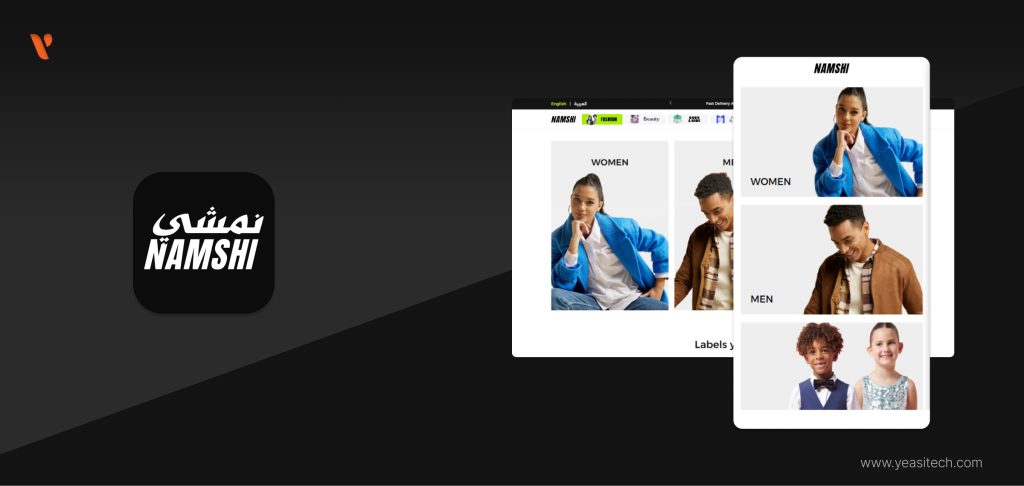
Namshi, a top online fashion store in the UAE, has improved the shopping experience with its own mobile app. Since starting in 2011, it quickly became popular with fashion lovers in the area.
Impact
Namshi’s app’s simple interface and user-centric design improves browsing, which raises engagement and raises sales conversions. By integrating AI and machine learning, the program provides customized suggestions, significantly increasing the average order value.
Features like easy return policies, loyalty programs, and a seamless checkout process further encourage strong client loyalty; as a consequence, over 60% of orders originate from current customers.
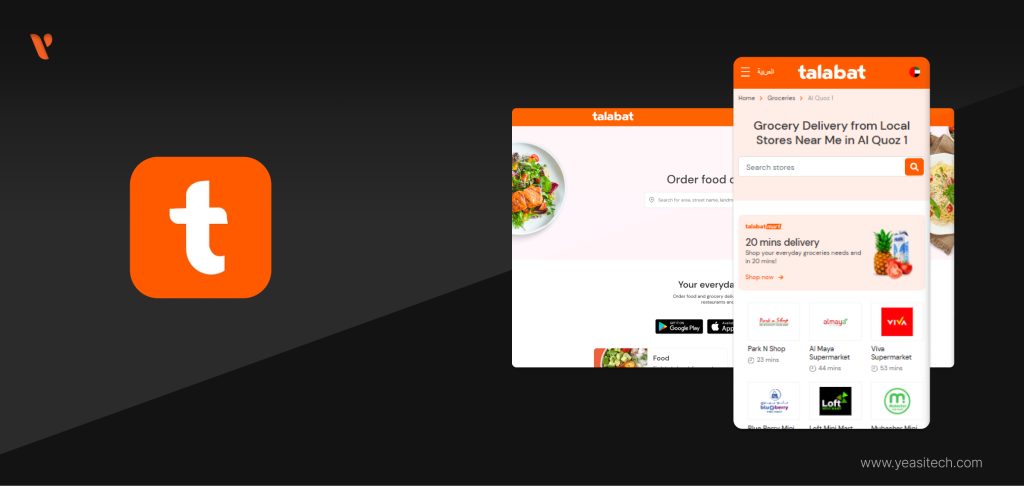
Talabat is a food delivery giant in the Middle East, including the UAE, which has successfully utilized a custom mobile app to streamline food ordering and delivery.
Impact
The Talabat app is easy to use and makes it simple to explore different eateries and food specialties. As a result, millions of downloads have been made. Further, users’ pleasure and trust are increased by the app’s real-time order tracking function.
Through partnerships with local restaurants and food businesses, Talabat has increased the scope of its menu choices and helped local businesses. As a result, the company has grown by more than 50% a year.
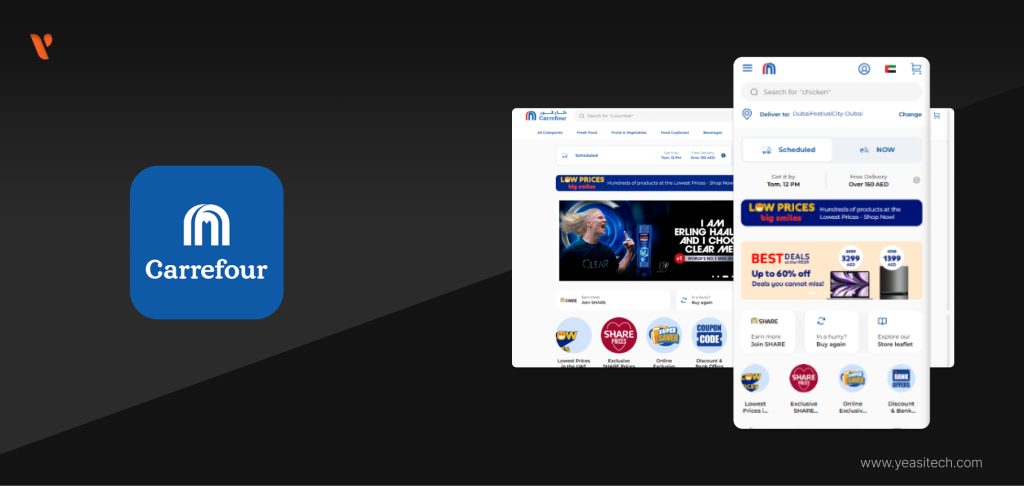
To fit the hectic routines of UAE citizens, Carrefour, run by Majid Al Futtaim, revolutionized the grocery shopping experience with its custom mobile app.
Impact
Grocery shopping is made easier with the Carrefour app, which allows users to schedule home delivery, view weekly offers, and purchase from anywhere. Online sales have grown by 30% as a result of this simplicity, particularly when push alerts regarding deals and discounts are used to promote client engagement. Also, the app collects valuable customer information that Carrefour uses to improve inventory management and develop user-specific marketing campaigns.
Amazon.ae, formerly known as Souq.com, has redefined e-commerce in the UAE with its customized mobile app that offers a vast array of items.
Impact
The app provides a wide variety of products, with millions of items, making it a convenient one-stop shop for customers and helping to attract more users and increase sales. It also includes local payment options, like cash on delivery and local credit cards, making online shopping easier for more people. Features such as customer reviews, product ratings, and simple return policies have built trust with shoppers, resulting in more people using the app and staying loyal to it.
Noon.com launched in 2017 as a competitor to established e-commerce platforms, quickly gaining traction through its custom mobile app.
Impact
To support local businesses and encourage a sense of community, Noon.com gives preference to local vendors and goods. Its innovative marketing strategies, such flash sales and exclusive deals, have been quite effective in building in a substantial user base. By focusing on technology and logistics, Noon.com has expanded rapidly and is currently a significant player in the UAE’s e-commerce industry.
As the UAE positions itself as a global e-commerce leader, the demand for custom mobile apps is set to surge. Tailored app development will enable businesses to leverage cutting-edge technologies like blockchain, augmented reality, and artificial intelligence for a competitive edge.
Key Trends to Monitor
In conclusion, adopting customized mobile apps will be important for companies looking to maintain their market position in 2025 as the UAE’s e-commerce industry continues to change. Custom apps not only increase client interaction and expedite processes, but they also customize the user experience.
With the fast growth of online shopping, companies like YeasiTech play a key role in offering customized solutions that help businesses meet market needs.
By investing in custom app development, e-commerce retailers in the UAE can set themselves up for ongoing success in this changing environment. For more tips on using technology for your business, check out Yeasitech.
Explore more about custom mobile apps, leave comments below with your ideas or questions, or get in touch with us to learn more!
Businesses may provide customized shopping experiences, simplify processes, and quickly adjust to evolving customer requirements with customized apps, helping them to remain competitive in a market that is changing quickly.
Custom apps may be developed according to the unique requirements and tastes of users, including features like customized suggestions, simpler navigation, and easy payment methods that all contribute to increased customer satisfaction.
Companies should first evaluate their unique requirements and objectives. Then, they should work with knowledgeable developers, such as Yeasitech, to design a plan that supports their e-commerce objectives.
E-commerce involves buying and selling goods/services online, offering convenience, a global reach, and automated processes. Traditional commerce occurs in physical stores, requiring face-to-face interactions and physical inventory handling.
E-commerce focuses only on online transactions (buying and selling). E-business includes all digital business operations, such as supply chain management, customer service, and marketing, beyond just selling products online.
E-commerce refers to all online transactions conducted via desktop or mobile devices. M-commerce (mobile commerce) is a subset of e-commerce, specifically focusing on transactions through smartphones and mobile apps.
Niche-focused e-commerce targets a specific audience with specialized products or services (e.g., eco-friendly clothing, handmade jewelry). It helps businesses stand out, attract loyal customers, and reduce competition.
The 5C model of e-commerce includes five key elements: Customer, which focuses on buyer engagement and satisfaction; Content, which provides valuable product information; Community, which fosters trust and brand loyalty; Commerce, which ensures smooth transactions; and Context, which personalizes the shopping experience.
While e-commerce is growing rapidly, physical stores still offer in-person experiences. The future is a blend of both, with innovations like click-and-collect, smart stores, and hybrid shopping experiences.
Most e-commerce sites are legitimate, but scams exist. To shop safely, check for HTTPS, read reviews, verify contact details and return policies, and beware of deals that seem too good to be true. Stay vigilant for a secure shopping experience.
E-commerce empowers businesses by expanding market reach, reducing costs, providing data insights, and enhancing customer convenience and loyalty. Automation further boosts efficiency and scalability.
E-commerce is essential today as it offers 24/7 shopping, global market access, cost efficiency, faster transactions, and secure, contactless shopping—key benefits in recent years.
YeasiTech is a trusted IT service partner with 8+ years of experience, empowering 250+ businesses with scalable web, mobile and AI solutions.
Explore related topics to broaden your understanding and gain actionable insights that can transform your strategies.